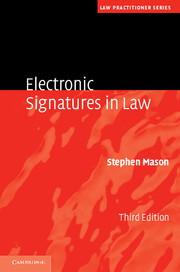Book contents
- Frontmatter
- Contents
- Preface
- Acknowledgements
- Table of cases
- 1 The signature
- 2 International initiatives
- 3 European Union Directive on electronic signatures
- 4 England and Wales, Northern Ireland and Scotland
- 5 International comparison of electronic signature laws
- 6 The form of an electronic signature
- 7 Digital signatures
- 8 Liability
- 9 Evidence
- 10 Data protection
- Index
2 - International initiatives
- Frontmatter
- Contents
- Preface
- Acknowledgements
- Table of cases
- 1 The signature
- 2 International initiatives
- 3 European Union Directive on electronic signatures
- 4 England and Wales, Northern Ireland and Scotland
- 5 International comparison of electronic signature laws
- 6 The form of an electronic signature
- 7 Digital signatures
- 8 Liability
- 9 Evidence
- 10 Data protection
- Index
Summary
The approach taken by a government in determining how legislation is to be enacted can affect the infrastructure of the electronic environment in a particular jurisdiction. Some jurisdictions favour the use of digital signatures carried on smart cards for the signature process, while others have developed a state public key infrastructure, with a certification authority acting as a trusted third party. Other governments have enacted legislation that seeks to be neutral, thus allowing for the changes in technology that are bound to alter over time.
United Nations Commission on International Trade (UNCITRAL)
Sets of uniform rules have been prepared by UNCITRAL: the Model Law on Electronic Commerce and the Model Law on Electronic Signatures, together with the 2005 United Nations Convention on the Use of Electronic Communications in International Contracts. The Model Laws are intended to provide help, guidance and an instrument for national states to use in forming legislation. While states are encouraged to incorporate both the Model Law on Electronic Commerce and the Model Law on Electronic Signatures fully into their domestic legislation, changes can be made to the content. The Model Laws are complementary to each other, although many states enacted legislation relating to electronic signatures before the final version of the Model Law on Electronic Signatures was adopted. The following discussion is intended to bring the salient issues to the attention of the reader.
- Type
- Chapter
- Information
- Electronic Signatures in Law , pp. 87 - 104Publisher: Cambridge University PressPrint publication year: 2012



